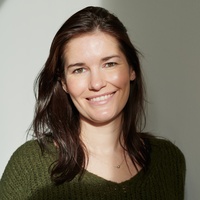Orphée De Clercq
- Position
- Academic staff
- E-mail address
- orphee.declercq@ugent.be
- Room
- B0.05
- Telephone number
- +32 9 33 11 938
- Curriculum vitae
- (.pdf)

About Orphée
Orphée is associate professor of language technology for educational applications. She is interested in how Natural Language Processing (NLP) can aid language learning and investigates how deeper linguistic knowledge can - maybe already is - or should be incorporated into the current state of the art. She has great expertise in linguistic text processing at the word, sentence and text level, corpus creation and applying state-of-the-art machine learning methodologies to NLP applications in a variety of domains and languages (though she does have a weak spot for her native language: Dutch). She is an advocate of human-centered AI and interdisciplinary research.
In 2015, she obtained her PhD, for which she devised the first state-of-the-art classification-based readability prediction system for Dutch and the first end-to-end system for fine-grained sentiment analysis. For both systems she investigated the added value of incorporating deep semantic and discourse knowledge in the form of semantic roles, linked open data and coreferential relations. During her postdoc, Orphée further elaborated on her readability research by investigating domain portability. At the same time, her focus shifted towards automated writing evaluation. Her work on sentiment analysis has evolved as well, she explored new techniques for porting her sentiment and emotion analysis pipeline to different domains and languages and has successfully finalized two valorization projects with the industry. She started her Tenure Track in 2021 and was promoted to associate professor in February 2026. She has been trying to find answers to questions such as: “How can we better support learners and teachers using novel techniques from NLP and ML?” “Is it desirable and possible to incorporate more deep linguistic knowledge?” “How can we better understand the inner workings of present-day LLMs and generative chatbots when it comes to language processing and learning” and “What is the influence of the recent techological evolutions on the four language skills, and on language in general?”
Orphée has been (co-)supervising PhD students and more senior researchers on subjects related to automated writing support and assessment, translatability prediction, transfer learning for emotion detection, cross-lingual projection and coreference resolution. NLP is an inherently interdisciplinary research field and in various projects she has been extensively seeking collaboration with researchers and stakeholders from other domains (such as Education, Communication Science, Computer Science and Psychology). She is also a promotor of the Steunpunt Centrale Toetsen in Onderwijs, responsible for exploring the feasibility of automatically assessing the writing skills of Flemish pupils.
Orphée takes up an active role in the NLP community. She has published over 50 long papers in leading journals (e.g. Computational Linguistics, Natural Language Engineering, Expert Systems with Applications, Language Resources and Evaluation) and at top conferences (e.g. ACL, EACL, NAACL, LREC, RANLP). She has co-organized shared tasks on the topics of automated writing support (MultiGED-2023 and MultiGEC-2025) and sentiment and emotion analysis (SemEval 2016: Task 5, IEST2018). The objective of such tasks is to build benchmark datasets on which research teams worldwide evaluate their systems. She frequently delivers keynotes and presents her work in both Belgium and abroad, has (co-)organized workshops and conferences and reviews for leading journals (Language Resources and Evaluation, PLOS ONE, Future Generation Computer Systems, Artificial Intelligence Review), conferences (ACL, EACL, COLING, IJCAI, LREC, EMNLP) and workshops (BEA, WASSA) in the broad field of language technology and education.
She is lecturer-in-charge of the course Computer-Assisted Language Learning, two courses on Digital Communication and always eager to supervise Bachelor and Master students to help them take their first steps into the wonderful world of human-centered AI and NLP. Regarding the latter, she is very proud that at Ghent University and more specifically at her Department (of which she is a proud alumna) first-year students can already choose to combine an indepth language study with a track on NLP.
Together with her colleagues at the LT3 Team, Orphée co-authored the book “Taaltechnologie Ontrafeld: Hoe taal en technologie hand in hand gaan”. This book was published in Spring 2024 and is the first Dutch publication on language technology targeting a broad audience and over a 1,000 copies have already been sold.